formerly eScholarship Editions


|
|
|
|
Your search for
'Classical Politics' in subject
found 16 book(s). | Modify Search | Displaying 1 - 16 of 16 book(s) | |
| 1. | 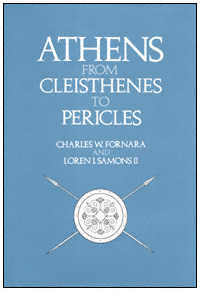 | Title: Athens from Cleisthenes to Pericles Author: Fornara, Charles W Published: University of California Press, 1991 Subjects: Classics | Classical History | Classical Politics Publisher's Description: By the mid fifth century B.C., Athens had become the most powerful city-state in Greece: a rich democracy led by Pericles that boldly gained control of an empire. Athens's strength under Pericles was the result of a complex interaction of events from the time of Cleisthenes. Fornara and Samons unravel the intricacies of the conflicting ancient sources to show how the development of both democracy and empire were interdependent in Athens's multifaceted evolution. The authors trace and contrast four stands of development: the history of the Alcmeonid family of Cleisthenes and Pericles, the nature and development of Athenian democracy, the growth of Athenian empire, and the burgeoning antagonism between Athens and Sparta. The fresh perspective thus afforded by this clear presentation will intrigue those with interests in both ancient economics and politics.The figure of Pericles is central to all four avenues of inquiry. His decision to create the enmisthos polis marked a fateful turn. Henceforth the democracy and the empire presupposed each other. Ultimately, Pericles's policies fueled Sparta's growing insecurity, resulting in her declaration of war on Athens in 431 B.C. and Athens's eventual fall. [brief] Similar Items |
| 2. | 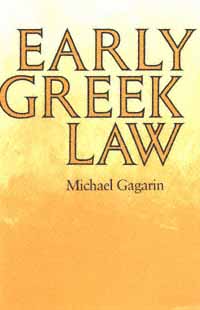 | Title: Early Greek law Author: Gagarin, Michael Published: University of California Press, 1989 Subjects: Classics | Classical Politics | Law Publisher's Description: Drawing on the evidence of anthropology as well as ancient literature and inscriptions, Gagarin examines the emergence of law in Greece from the 8th through the 6th centuries B.C., that is, from the oral culture of Homer and Hesiod to the written enactment of codes of law in most major cities. Similar Items |
| 3. | 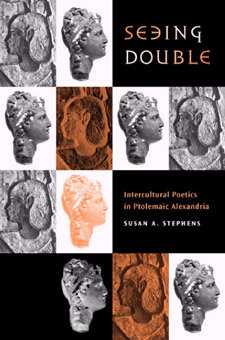 | Title: Seeing double: intercultural poetics in Ptolemaic Alexandria Author: Stephens, Susan A Published: University of California Press, 2003 Subjects: Classics | Classical Literature and Language | Poetry | Classical Politics Publisher's Description: When, in the third century B.C.E., the Ptolemies became rulers in Egypt, they found themselves not only kings of a Greek population but also pharaohs for the Egyptian people. Offering a new and expanded understanding of Alexandrian poetry, Susan Stephens argues that poets such as Callimachus, Theocritus, and Apollonius proved instrumental in bridging the distance between the two distinct and at times diametrically opposed cultures under Ptolemaic rule. Her work successfully positions Alexandrian poetry as part of the dynamic in which Greek and Egyptian worlds were bound to interact socially, politically, and imaginatively. The Alexandrian poets were image-makers for the Ptolemaic court, Seeing Double suggests; their poems were political in the broadest sense, serving neither to support nor to subvert the status quo, but to open up a space in which social and political values could be imaginatively re-created, examined, and critiqued. Seeing Double depicts Alexandrian poetry in its proper context - within the writing of foundation stories and within the imaginative redefinition of Egypt as "Two Lands" - no longer the lands of Upper and Lower Egypt, but of a shared Greek and Egyptian culture. [brief] Similar Items |
| 4. | 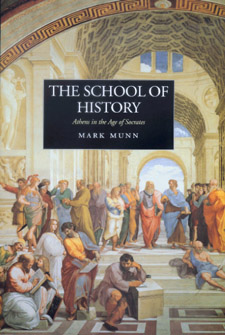 | Title: The school of history: Athens in the age of Socrates Author: Munn, Mark Henderson Published: University of California Press, 2000 Subjects: Classics | Classical History | Ancient History | Classical Politics Publisher's Description: History, political philosophy, and constitutional law were born in Athens in the space of a single generation--the generation that lived through the Peloponnesian War (431-404 b.c.e.). This remarkable age produced such luminaries as Socrates, Herodotus, Thucydides, Sophocles, Euripides, Aristophanes, and the sophists, and set the stage for the education and early careers of Plato and Xenophon, among others. The School of History provides the fullest and most detailed intellectual and political history available of Athens during the late fifth century b.c.e., as it examines the background, the context, and the decisive events shaping this society in the throes of war. This expansive, readable narrative ultimately leads to a new understanding of Athenian democratic culture, showing why and how it yielded such extraordinary intellectual productivity. As both a source and a subject, Thucydides' history of the Peloponnesian War is the central text around which the narrative and thematic issues of the book revolve. Munn re-evaluates the formation of the Greek historiographical tradition itself as he identifies the conditions that prompted Thucydides to write--specifically the historian's desire to guide the Athenian democracy as it struggled to comprehend its future. The School of History fully encompasses recent scholarship in history, literature, and archaeology. Munn's impressive mastery of the huge number of sources and publications informs his substantial contributions to our understanding of this democracy transformed by war. Immersing us fully in the intellectual foment of Athenian society, The School of History traces the history of Athens at the peak of its influence, both as a political and military power in its own time and as a source of intellectual inspiration for the centuries to come. [brief] Similar Items |
| 5. | 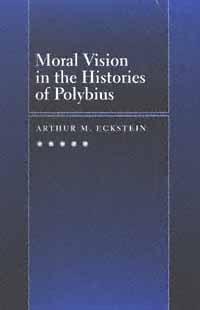 | Title: Moral vision in the Histories of Polybius Author: Eckstein, Arthur M Published: University of California Press, 1995 Subjects: Classics | History | Classical Politics | Political Theory | Ancient History Publisher's Description: Arthur Eckstein's fresh and stimulating interpretation challenges the way Polybius' Histories have long been viewed. He argues that Polybius evaluates people and events as much from a moral viewpoint as from a pragmatic, utilitarian, or even "Machiavellian" one. Polybius particularly asks for "improvement" in his audience, hoping that those who study his writings will emerge with a firm determination to live their lives nobly. Teaching by the use of moral exemplars, Polybius also tries to prove that success is not the sole standard by which human action should be judged. [brief] Similar Items |
| 6. | 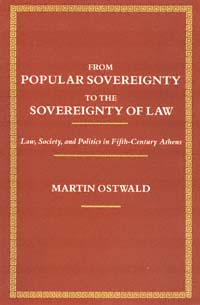 | Title: From popular sovereignty to the sovereignty of law: law, society, and politics in fifth-century Athens Author: Ostwald, Martin 1922- Published: University of California Press, 1987 Subjects: Classics | Classics | Classical History | Classical Politics Publisher's Description: Analyzing the "democratic" features and institutions of the Athenian democracy in the fifth century B.C., Martin Ostwald traces their development from Solon's judicial reforms to the flowering of popular sovereignty, when the people assumed the right both to enact all legislation and to hold magistr . . . [more] Similar Items |
| 7. | 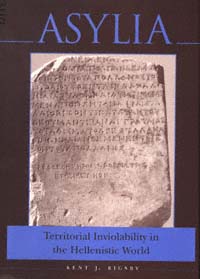 | Title: Asylia: territorial inviolability in the Hellenistic world Author: Rigsby, Kent J 1945- Published: University of California Press, 1997 Subjects: Classics | Ancient History | Politics | Classical History | Classical Religions | Classical Politics Publisher's Description: In the Hellenistic period certain Greek temples and cities came to be declared "sacred and inviolable." Asylia was the practice of declaring religious places precincts of asylum, meaning they were immune to violence and civil authority. The evidence for this phenomenon - mainly inscriptions and coins - is scattered in the published record. The material has never been collected and presented in one publication until now.Kent J. Rigsby lays out these documents and discusses their historical implications in a substantial introduction. He argues that while a hopeful intention of military neutrality lay behind the institution of asylum, the declarations did not in fact change military behavior. Instead, "declared inviolability" became a civic and religious honor for which cities across the Greek world competed during the third to first centuries B.C. [brief] Similar Items |
| 8. | 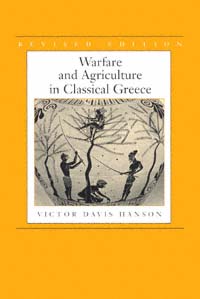 | Title: Warfare and agriculture in classical Greece Author: Hanson, Victor Davis Published: University of California Press, 1998 Subjects: Classics | Classical History | Military History | Ancient History | Classical Politics | Agriculture Publisher's Description: The ancient Greeks were for the most part a rural, not an urban, society. And for much of the Classical period, war was more common than peace. Almost all accounts of ancient history assume that farming and fighting were critical events in the lives of the citizenry. Yet never before have we had a comprehensive modern study of the relationship between agriculture and warfare in the Greek world. In this completely revised edition of Warfare and Agriculture in Classical Greece , Victor Davis Hanson provides a systematic review of Greek agriculture and warfare and describes the relationship between these two important aspects of life in ancient communities. With careful attention to agronomic as well as military details, this well-written, thoroughly researched study reveals the remarkable resilience of those farmland communities.In the past, scholars have assumed that the agricultural infrastructure of ancient society was often ruined by attack, as, for example, Athens was relegated to poverty in the aftermath of the Persian and later Peloponnesian invasions. Hanson's study shows, however, that in reality attacks on agriculture rarely resulted in famines or permanent agrarian depression. Trees and vines are hard to destroy, and grainfields are only briefly vulnerable to torching. In addition, ancient armies were rather inefficient systematic ravagers and instead used other tactics, such as occupying their enemies' farms to incite infantry battle. Warfare and Agriculture in Classical Greece suggests that for all ancient societies, rural depression and desolation came about from more subtle phenomena - taxes, changes in political and social structure, and new cultural values - rather than from destructive warfare. [brief] Similar Items |
| 9. | 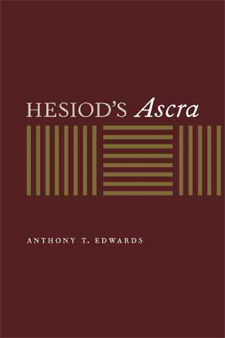 | Title: Hesiod's Ascra Author: Edwards, Anthony T Published: University of California Press, 2004 Subjects: Classics | Classical History | Classical Politics | Classical Literature and Language | Economics and Business Publisher's Description: In Works and Days, one of the two long poems that have come down to us from Hesiod, the poet writes of farming, morality, and what seems to be a very nasty quarrel with his brother Perses over their inheritance. In this book, Anthony T. Edwards extracts from the poem a picture of the social structure of Ascra, the hamlet in northern Greece where Hesiod lived, most likely during the seventh century b.c.e. Drawing on the evidence of trade, food storage, reciprocity, and the agricultural regime as Hesiod describes them in Works and Days, Edwards reveals Ascra as an autonomous village, outside the control of a polis, less stratified and integrated internally than what we observe even in Homer. In light of this reading, theconflict between Hesiod and Perses emerges as a dispute about the inviolability of the community's external boundary and the degree of interobligation among those within the village. Hesiod's Ascra directly counters the accepted view of Works and Days, which has Hesiod describing a peasant society subordinated to the economic and political control of an outside elite. Through his deft analysis, Edwards suggests a new understanding of both Works and Days and the social and economic organization of Hesiod's time and place. [brief] Similar Items |
| 10. | 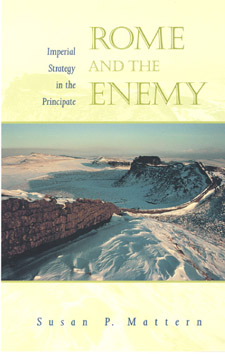 | Title: Rome and the enemy: imperial strategy in the principate Author: Mattern, Susan P 1966- Published: University of California Press, 1999 Subjects: Classics | Classical History | Classical Politics | Classical Literature and Language | Military History | Ancient History Publisher's Description: How did the Romans build and maintain one of the most powerful and stable empires in the history of the world? This illuminating book draws on the literature, especially the historiography, composed by the members of the elite who conducted Roman foreign affairs. From this evidence, Susan P. Mattern reevaluates the roots, motivations, and goals of Roman imperial foreign policy especially as that policy related to warfare. In a major reinterpretation of the sources, Rome and the Enemy shows that concepts of national honor, fierce competition for status, and revenge drove Roman foreign policy, and though different from the highly rationalizing strategies often attributed to the Romans, dictated patterns of response that remained consistent over centuries. Mattern reconstructs the world view of the Roman decision-makers, the emperors, and the elite from which they drew their advisers. She discusses Roman conceptions of geography, strategy, economics, and the influence of traditional Roman values on the conduct of military campaigns. She shows that these leaders were more strongly influenced by a traditional, stereotyped perception of the enemy and a drive to avenge insults to their national honor than by concepts of defensible borders. In fact, the desire to enforce an image of Roman power was a major policy goal behind many of their most brutal and aggressive campaigns. Rome and the Enemy provides a fascinating look into the Roman mind in addition to a compelling reexamination of Roman conceptions of warfare and national honor. The resulting picture creates a new understanding of Rome's long mastery of the Mediterranean world. [brief] Similar Items |
| 11. | 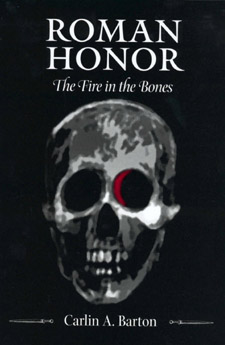 | Title: Roman honor: the fire in the bones Author: Barton, Carlin A 1948- Published: University of California Press, 2001 Subjects: Classics | Ancient History | Classical History | Classical Politics | Classical Religions | Comparative Literature Publisher's Description: This book is an attempt to coax Roman history closer to the bone, to the breath and matter of the living being. Drawing from a remarkable array of ancient and modern sources, Carlin Barton offers the most complex understanding to date of the emotional and spiritual life of the ancient Romans. Her provocative and original inquiry focuses on the sentiments of honor that shaped the Romans' sense of themselves and their society. Speaking directly to the concerns and curiosities of the contemporary reader, Barton brings Roman society to life, elucidating the complex relation between the inner life of its citizens and its social fabric. Though thoroughly grounded in the ancient writings - especially the work of Seneca, Cicero, and Livy - this book also draws from contemporary theories of the self and social theory to deepen our understanding of ancient Rome. Barton explores the relation between inner desires and social behavior through an evocative analysis of the operation, in Roman society, of contests and ordeals, acts of supplication and confession, and the sense of shame. As she fleshes out Roman physical and psychological life, she particularly sheds new light on the consequential transition from republic to empire as a watershed of Roman social relations. Barton's ability to build productively on both old and new scholarship on Roman history, society, and culture and her imaginative use of a wide range of work in such fields as anthropology, sociology, psychology, modern history, and popular culture will make this book appealing for readers interested in many subjects. This beautifully written work not only generates insight into Roman history, but also uses that insight to bring us to a new understanding of ourselves, our modern codes of honor, and why it is that we think and act the way we do. [brief] Similar Items |
| 12. | 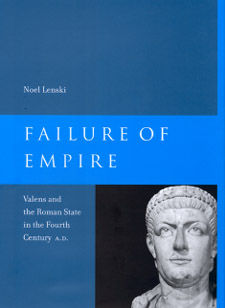 | Title: Failure of empire: Valens and the Roman state in the fourth century A.D Author: Lenski, Noel Emmanuel 1965- Published: University of California Press, 2003 Subjects: Classics | History | Classical History | Ancient History | Classical Politics | Autobiographies and Biographies Publisher's Description: Failure of Empire is the first comprehensive biography of the Roman emperor Valens and his troubled reign (a.d. 364-78). Valens will always be remembered for his spectacular defeat and death at the hands of the Goths in the Battle of Adrianople. This singular misfortune won him a front-row seat among history's great losers. By the time he was killed, his empire had been coming unglued for several years: the Goths had overrun the Balkans; Persians, Isaurians, and Saracens were threatening the east; the economy was in disarray; and pagans and Christians alike had been exiled, tortured, and executed in his religious persecutions. Valens had not, however, entirely failed in his job as emperor. He was an admirable administrator, a committed defender of the frontiers, and a ruler who showed remarkable sympathy for the needs of his subjects. In lively style and rich detail, Lenski incorporates a broad range of new material, from archaeology to Gothic and Armenian sources, in a study that illuminates the social, cultural, religious, economic, administrative, and military complexities of Valens's realm. Failure of Empire offers a nuanced reconsideration of Valens the man and shows both how he applied his strengths to meet the expectations of his world and how he ultimately failed in his efforts to match limited capacities to limitless demands. [brief] Similar Items |
| 13. | 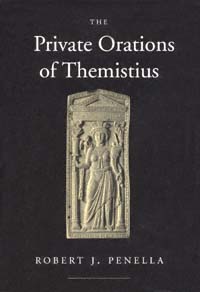 | Title: The private orations of Themistius Author: Themistius Published: University of California Press, 1999 Subjects: Classics | Classical Literature and Language | Classical History | Classical Politics | Classical Religions | Ancient History Publisher's Description: Themistius was a philosopher, a prominent Constantinopolitan senator, and an adviser to Roman emperors during the fourth century A.D. In this first translation of Themistius's private orations to be published in English, Robert J. Penella makes accessible texts that shed significant light on the culture of Constantinople and, more generally, the eastern Roman empire during the fourth century. The sixteen speeches translated here are equipped with ample annotations and an informative introduction, making them a valuable resource on the late antique period, as well as on Greek intellectual history and oratory.In Themistius's public orations, he played the role of imperial panegyrist, but in the "private" or unofficial orations presented here, the senator concerns himself with apologetics, rhetorical and philosophical programs, material of autobiographical interest, and ethical themes. The speeches are valuable as evidence for the political, social, philosophical, religious, and literary history of fourth century Byzantium, and as examples of pagan ideology and eloquence in the newly Christianized court. Themistius argues, among other things, that the philosopher should be involved in public affairs, that the lessons of philosophy should be broadcast to the masses, and that it is appropriate for the philosopher to be an effective orator in order to circulate his teachings. [brief] Similar Items |
| 14. | 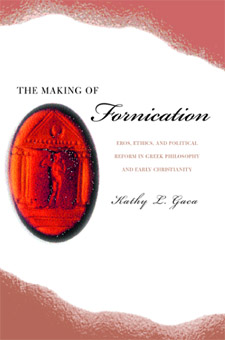 | Title: The making of fornication: eros, ethics, and political reform in Greek philosophy and early Christianity Author: Gaca, Kathy L Published: University of California Press, 2003 Subjects: Classics | Classical Philosophy | Classical Religions | Classical Politics | Christianity | Ethics | Social and Political Thought | Ancient History | Intellectual History Publisher's Description: This provocative work provides a radical reassessment of the emergence and nature of Christian sexual morality, the dominant moral paradigm in Western society since late antiquity. While many scholars, including Michel Foucault, have found the basis of early Christian sexual restrictions in Greek ethics and political philosophy, Kathy L. Gaca demonstrates on compelling new grounds that it is misguided to regard Greek ethics and political theory - with their proposed reforms of eroticism, the family, and civic order - as the foundation of Christian sexual austerity. Rather, in this thoroughly informed and wide-ranging study, Gaca shows that early Christian goals to eradicate fornication were derived from the sexual rules and poetic norms of the Septuagint, or Greek Bible, and that early Christian writers adapted these rules and norms in ways that reveal fascinating insights into the distinctive and largely non-philosophical character of Christian sexual morality. Writing with an authoritative command of both Greek philosophy and early Christian writings, Gaca investigates Plato, the Stoics, the Pythagoreans, Philo of Alexandria, the apostle Paul, and the patristic Christians Clement of Alexandria, Tatian, and Epiphanes, freshly elucidating their ideas on sexual reform with precision, depth, and originality. Early Christian writers, she demonstrates, transformed all that they borrowed from Greek ethics and political philosophy to launch innovative programs against fornication that were inimical to Greek cultural mores, popular and philosophical alike. The Septuagint's mandate to worship the Lord alone among all gods led to a Christian program to revolutionize Gentile sexual practices, only for early Christians to find this virtually impossible to carry out without going to extremes of sexual renunciation. Knowledgeable and wide-ranging, this work of intellectual history and ethics cogently demonstrates why early Christian sexual restrictions took such repressive ascetic forms, and casts sobering light on what Christian sexual morality has meant for religious pluralism in Western culture, especially among women as its bearers. [brief] Similar Items |
| 15. | 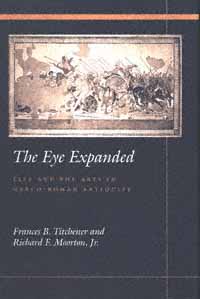 | Title: The eye expanded: life and the arts in Greco-Roman antiquity Author: Titchener, Frances B 1954- Published: University of California Press, 1999 Subjects: Classics | Classical History | Classical Literature and Language | Art and Architecture | Classical Politics | Classical Religions | Ancient History Publisher's Description: Plato and Aristotle both believed that the arts were mimetic creations of the human mind that had the power to influence society. In this they were representative of a widespread consensus in ancient culture. Cultural and political impulses informed the fine arts, and these in turn shaped - and were often intended to shape - the living world. The contributors to this volume, all of whom have been encouraged and inspired by the work of Peter Green, document the interaction between life and the arts that has made art more lively and life more artful in sixteen essays with subjects ranging from antiquity to modern times.With topics ranging from Antigone to D. H. Lawrence and Norman Douglas, and from Bactrian coins to Livy's characterization of women, the scope, the zest, and the scholarship of these essays will illuminate new avenues in our understanding of the relationship between classics and culture, and in our appreciation of both the artistic products that have come down to us and the varieties of life from which they spring. [brief] Similar Items |
| 16. | 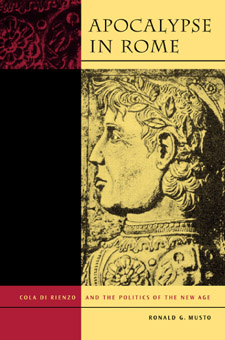 | Title: Apocalypse in Rome: Cola di Rienzo and the politics of the New Age Author: Musto, Ronald G Published: University of California Press, 2003 Subjects: History | European Studies | Medieval History | Medieval Studies | Autobiographies and Biographies | Classical Politics | Autobiographies and Biographies Publisher's Description: On May 20, 1347, Cola di Rienzo overthrew without violence the turbulent rule of Rome's barons and the absentee popes. A young visionary and the best political speaker of his time, Cola promised Rome a return to its former greatness. Ronald G. Musto's vivid biography of this charismatic leader - whose exploits have enlivened the work of poets, composers, and dramatists, as well as historians - peels away centuries of interpretation to reveal the realities of fourteenth-century Italy and to offer a comprehensive account of Cola's rise and fall. A man of modest origins, Cola gained a reputation as a talented professional with an unparalleled knowledge of Rome's classical remains. After earning the respect and friendship of Petrarch and the sponsorship of Pope Clement VI, Cola won the affections and loyalties of all classes of Romans. His buono stato established the reputation of Rome as the heralded New Jerusalem of the Apocalypse and quickly made the city a potent diplomatic and religious center that challenged the authority - and power - of both pope and emperor. At the height of Cola's rule, a conspiracy of pope and barons forced him to flee the city and live for years as a fugitive until he was betrayed and taken to Avignon to stand trial as a heretic. Musto relates the dramatic story of Cola's subsequent exoneration and return to central Italy as an agent of the new pope. But only weeks after he reestablished his government, he was slain by the Romans atop the Capitoline hill. In his exploration, Musto examines every known document pertaining to Cola's life, including papal, private, and diplomatic correspondence rarely used by earlier historians. With his intimate knowledge of historical Rome - its streets and ruins, its churches and palaces, from the busy Tiber riverfront to the lost splendor of the Capitoline - he brings a cinematic flair to this fascinating historical narrative. [brief] Similar Items |